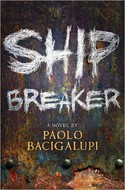Andre Norton Award Finalist (2010)
National Book Award Finalist, Young People's Literature (2010)
ALA Best Fiction for Young Adults (2011)
Printz Award (2011)
Booktalk:
While scavenging in an old ocean tanker, Nailer falls into a vat of oil, still black gold in his world years upon years ahead of ours. In order to survive, he has to watch all of that oil wash into the ocean. Still, he's lucky to be alive. He thinks his luck is going to give him a second chance when he and Pima find a clipper washed up on shore after a city wrecker of a storm. It's full of silver, gold, and other valuables in addition to regular old copper and steel scavenge. It's their own lucky strike. Until the dead swank in one of the clipper's cabins blinks.
Review:
The world in which Nailer lives and works is brutal. He and his friend Pima are on light crew which means they pick light scavenge from old ships, primarily pulling copper wire from small utility ducts. This is opposed to heavy crew, where Pima's mother works pulling steel and other valuable metals from the same ships. These are the only good options in life. The only others are to become professional fighters who moonlight as security (like Nailer's dad), sell of body parts and/or fluids, or become some version of a prostitute. Basically, even though Nailer is doing dangerous and backbreaking work that almost gets him killed, he was lucky even before he survived his dip in the oil. He's also 15. Nailer's background and, really, his entire society make his decision to help Nita (the swank) more amazing. And it's that decision, so contrary to the way he's been taught to survive, that create an adventure story in the middle of a dystopian world.
I think one of the most amazing things about Ship Breaker, for me at least, is they way Bacigalupi accomplishes his world-building. This is a seriously complex world full of swanks, ship breakers, beach rats, half-men, and all the cultural implications these groups carry with them. Bacigalupi manages to explain all of this without ever sitting the reader down and explaining all of it, yet I was amazingly un-lost throughout the story. The world he builds is still our world too. Nailer lives on the Gulf Coast and takes a train that carries him over the drowned city of New Orleans. We can recognize leftovers from our day and age. It's clear that some kind of environmental fall-out has occured (in addition to a severe lack of oil and a submerged New Orleans, traders can sail right over the Arctic Circle), but the details of how we got from here to there are never explained, leaving the reader to put 2 and 2 together. No heavy-handed environmental message required (or present).
Ship Breaker is, at times, a very bleak book portraying a society in which each person is practically required to step over someone else to survive. Getting ahead is a pipe dream. But, like many other dystopian novels, its points of light that make the story. This is the kind of book that can stress you out (in a good way) while reading, and it will be a hit with your dystopia fans. My library is also adding it to our Environmental Justice bibliography for next year's incoming freshmen.
There is talk of a sequel, The Drowned Cities, but it's not showing up yet on the publisher's website, only on GoodReads.
Book source: Philly Free Library
Links to Amazon.com may be affiliate links for the Amazon Associates program. If you buy something through this link, I may receive a referral fee.

3 comments:
I think I might like it - thank you for a great review!
I bought this for my library (selfishly I think) and now I don't know if I should circulate it... I am in an elementary school, but I thought my 6th graders would like it- they loved the Hunger Games. What do you think?
Kelly
anachronist - Thanks! Fair warning: you'll be hurting for the sequel if you read this!
Kelly - First, welcome! Second, since you may have had selfish justifications for purchasing this title (I don't want that to come out as judgemental; I have so done this), I would suggest you read it before putting it on your shelves. In general, I wouldn't pass it out to every 6th grader that comes your way, but I think some of your Hunger Games fans could handle it. It's not any more graphic than The Hunger Games in terms of the violence, and there is no sex (just some really veiled talk of prostitution if one gets kicked off a work gang). Still, it felt grittier to me. I think because there are less elements of fantasy/sci-fi (like jabberjays and tracker-jackers), Ship Breaker feels more real/closer to our reality and therefore more intense/scary/upsetting. BUT you know your readers better than anyone! Once you've read this title (which I highly suggest!), you'll be able to judge who to share it with!
Post a Comment